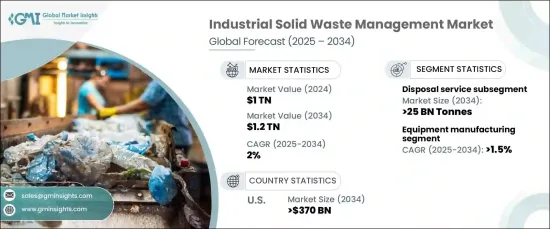
2024년에 1조 달러로 평가된 세계 산업 폐기물 관리 시장은 2025-2034년에 걸쳐 CAGR 2%로 안정된 성장을 이룰 것으로 예측되고 있습니다.
이 성장의 배경은 부적절한 폐기물 처리와 관련된 공중 보건 위험에 대한 의식 증가와 다양한 산업에서 지속가능성에 중점을 둘 수 있습니다. 세계가 공해와 폐기물 축적과 같은 환경 과제와 계속 싸우고 있는 가운데, 기업은 생태 실적를 최소화하는 보다 깨끗하고 효율적인 폐기물 관리 전략을 채택할 필요가 있습니다. 시장은 순환형 경제의 원칙으로 이동하는 기업이 늘어나 매립지에 대한 의존을 줄이는 세계의 노력과 일치하는 가능한 한 많은 폐기물의 재활용과 재이용을 목표로 하는 진화를 이루고 있습니다.

재활용 서비스에 대한 수요는 이 시장의 성장을 가속하는 요인 중 하나입니다. 재활용 부문은 폐기물 재활용 기술의 끊임없는 진보로 박차를 받고 2034년까지 250억 톤의 폐기물이 발생할 것으로 예상됩니다. 재활용 효율성을 높이고 매립지에 대한 의존도를 줄이기 위해 혁신적인 기술 주도 솔루션을 채택하는 기업이 늘고 있습니다. 최신 폐기물 처리 방법은 플라스틱, 종이, 목재 등 다양한 재료의 재활용률을 향상시키고 환경에 대한 악영향을 줄이면서 세계의 지속가능성에 대한 노력을 지원합니다.
| 시장 범위 | |
|---|---|
| 시작연도 | 2024년 |
| 예측연도 | 2025-2034 |
| 시작금액 | 1조 달러 |
| 예측 금액 | 1조 2,000억 달러 |
| CAGR | 2% |
장비 제조 부문에서는 2034년까지 시장이 1.5% 성장률로 확대될 것으로 예측됩니다. 이 성장은 국내 무역과 국제 무역 모두의 생산 수준 상승과 관련이 있습니다. 원료나 완성품의 수송에 플라스틱 포장이 널리 사용되고 있는 것이, 산업 폐기물량 증가에 크게 기여하고 있습니다. 특히 아시아태평양과 같은 급성장 지역에서는 제조 제품에 대한 소비자 수요가 증가하고 있으며, 효율적인 폐기물 관리 솔루션의 필요성이 그 어느 때보다 높아지고 있습니다.
미국의 산업 폐기물 관리 시장은 2034년까지 3,700억 달러에 이를 것으로 예측됩니다. 이 성장은 산업이 책임있는 폐기물 관리 사례를 채택하도록 장려하는 지방, 주 및 연방 수준의 규제 프레임 워크에 의해 지원됩니다. 폐기물 처리에 관한 법률의 엄격화는 오염자 부담 원칙과 같은 대처와 함께 기업이 환경 책임을 향해 적극적으로 행동하도록 추진하고 있습니다. 또한, 기술의 진보는 산업 폐기물 처리의 지속가능성을 촉진하는 최신 폐기물 관리 솔루션의 개발을 추진하고 있습니다.
The Global Industrial Solid Waste Management Market, valued at USD 1 trillion in 2024, is projected to experience steady growth at a CAGR of 2% from 2025 to 2034. This growth can be attributed to the growing awareness of the public health risks associated with improper waste disposal, as well as an increasing emphasis on sustainability across various industries. As the world continues to battle environmental challenges such as pollution and waste accumulation, businesses are under increasing pressure to adopt cleaner, more efficient waste management strategies that minimize their ecological footprint. The market is seeing an evolution with more businesses shifting toward circular economy principles, aiming to recycle and reuse as much waste as possible, which aligns with global efforts to reduce landfill dependence.

The demand for recycling services is one of the key drivers of this market's growth. The recycling segment is expected to generate 25 billion tonnes of waste by 2034, spurred by continuous advancements in waste recycling technologies. Companies are increasingly embracing innovative, tech-driven solutions to enhance recycling efficiency and reduce reliance on landfills. Modern waste processing methods are improving the recycling rates of various materials such as plastics, paper, and wood, supporting global sustainability efforts while mitigating environmental harm.
| Market Scope | |
|---|---|
| Start Year | 2024 |
| Forecast Year | 2025-2034 |
| Start Value | $1 Trillion |
| Forecast Value | $1.2 Trillion |
| CAGR | 2% |
In the equipment manufacturing sector, the market is forecast to expand at a rate of 1.5% through 2034. This growth is linked to rising production levels driven by both domestic and international trade. The widespread use of plastic packaging for shipping raw materials and finished goods is a significant contributor to increasing industrial waste volumes. With heightened consumer demand for manufactured products, particularly in fast-growing regions like Asia Pacific, the need for efficient waste management solutions is more pressing than ever.
The U.S. industrial solid waste management market is projected to reach USD 370 billion by 2034. This growth is supported by regulatory frameworks at local, state, and federal levels, which encourage industries to adopt responsible waste management practices. Stricter laws around waste disposal, along with initiatives like the Polluter-Pays Principle, are pushing businesses to take proactive steps toward environmental responsibility. Furthermore, advancements in technology continue to drive the development of modern waste management solutions that promote sustainability in handling industrial waste.